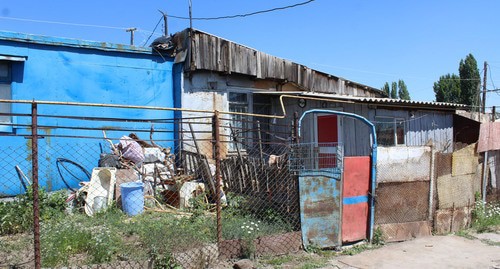
31 July 2019, 14:00
Victims of Spitak earthquake complain about living conditions in temporary shelters (+video)
In Gyumri, there are still about 2800 temporary buildings accommodating people who lost their houses during the earthquake of 1988, announced Vaan Tumasyan, the head of the "Shirak Centre". Victims of the earthquake say that for 30 years they have to live in rotten cabins and almost lost the hope to get new apartments.
The "Caucasian Knot" has reported that on July 26, the authorities announced the decision to move 453 families of the earthquake victims from temporary buildings to new housing.
The earthquake, known as "Spitak earthquake", occurred in Armenia exactly 30 years ago, on December 7, 1988. The highest seismic activity was registered near the village of Nalband, which had gone completely underground. Besides, the disaster also severely damaged 20 cities and more than 340 villages. The town of Spitak was destroyed completely, and Gyumri, Stepanavan, and Vanadzor partially. More than 25,000 people perished in the tragedy; at least 500,000 local residents lost their housing.
Over the past 2-3 years, no state aid programmes for the earthquake victims have been implemented either in Gyumri or in other settlements, states Vaan Tumasyan.
In Gyumri, there are about 2800 temporary buildings, of which about 400 are locked (no one lives in them).
The problem of emergency houses to be demolished is also relevant in Gyumri. There are 92 such buildings in Gyumri, and about 2000 families live in them, Vaan Tumasyan reports.
"That is, the problem of homeless people in Gyumri is very acute. Meanwhile, in recent years we talk only about temporary shelters with the most inhuman conditions. The social situation of people living in them is the most difficult," said Vaan Tumasyan.
The Minasyan family members have been living in a temporary shelter since February 1989, 56-year-old Gayane Minasyan tells the "Caucasian Knot" correspondent.
The woman complained that during rains, the roof of the cabin is leaking, and they have to put basins all over the house, the walls of the cabin are covered with mould, and the floor has already rotted out. "We will hardly ever be able to buy an apartment on our own, and we don't even hope to receive help from anyone," Gayane Minasyan complained.
See the photo report "Earthquake zone: three decades in temporary cabins" prepared by the "Caucasian Knot" correspondent to find out how temporary shelters, in which earthquake victims have to live, look like.
This article was originally published on the Russian page of 24/7 Internet agency ‘Caucasian Knot’ on July 31, 2019 at 08:45 am MSK. To access the full text of the article, click here.
Author: Armine Martirosyan Source: CK correspondent




